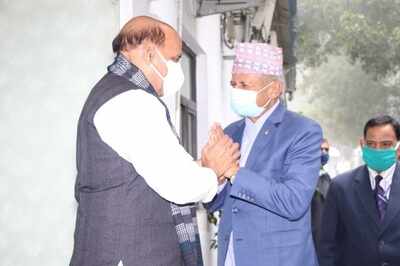- News
- India News
- As China works to prevent split, Nepal FM says won't allow foreign interference
Trending
This story is from January 16, 2021
As China works to prevent split, Nepal FM says won't allow foreign interference
Amid Chinese efforts to prevent a split in the ruling Nepal Communist Party (NCP), visiting Nepal foreign minister Pradeep Gyawali Saturday said while some countries may have concerns about the current political situation in Nepal, Kathmandu won't accept interference by any foreign power in Nepal's domestic politics.

Gyawali's remark was in response to a ToI query on China's overt attempts to get PM K P Oli and his rival P K Dahal Prachanda to patch up their differences and keep the party intact.

"We are able to settle our problems ourselves. Being close neighbour, there may be some concerns, questions, but we never accept interference from external side," said Gyawali, adding that Nepal’s relations with both China and India are excellent. The minister refused to further talk about China's role in resolving the NCP dispute saying that it wouldn't be proper for him to talk about a third country from foreign soil.
After the Joint Commission Meeting (JCM) with his counterpart S Jaishankar, Gyawali Saturday also met defence minister Rajnath Singh. Despite the political instability in Nepal, that saw PM Oli dissolving last year the House of Representatives and splitting the party into two, the Oli government was keen to go ahead with the JCM meeting apparently to ensure the recent momentum in bilateral cooperation wasn't disturbed. Dahal though, just before Gyawali landed in India, accused Oli of acting at the behest of India in dissolving the House of Representatives.
"It was an internal problem. I don’t think that it is wise to blame anybody. In parliamentary system, if PM thinks that time has come now to seek fresh mandate, it is universally accepted practice that the president can dissolve parliament and seek mandate," said Gyawali.
In an interaction with journalists early morning, Gyawali again underlined the need for resolving the border dispute in the Kalapani and Susta areas.
Gyawali said India and Nepal had made a "common commitment" to work on resolving the outstanding border issues soon. "The modality for it is under discussion. Sanctity of the border is extremely important to make it secure. Demarcation is extremely important," said Gyawali, while emphasising the importance of the 1846 Sugauli treaty in addressing the border issue.
The Nepal government claims that as per the Treaty, all the territories east of Kali (Mahakali) River, including the disputed Limpiyadhura (where the Kali river originates), Kalapani and Lipulekh, belong to Nepal.
Even as India maintained that the border-related issues will only be addressed through appropriate channels, Nepal brought up the Kalapani issue in the JCM meeting saying that it was important to rid an otherwise strong relationship of this irritant. Nepal also said in its statement that the meeting discussed the boundary matter and expressed the commitment for early completion of the boundary works in the remaining segments.
End of Article
FOLLOW US ON SOCIAL MEDIA










